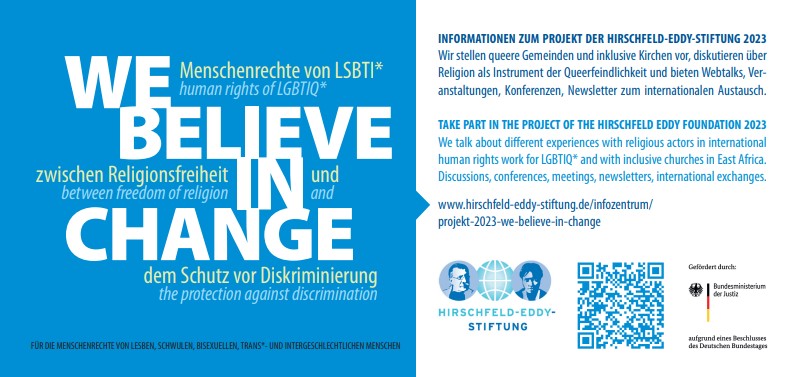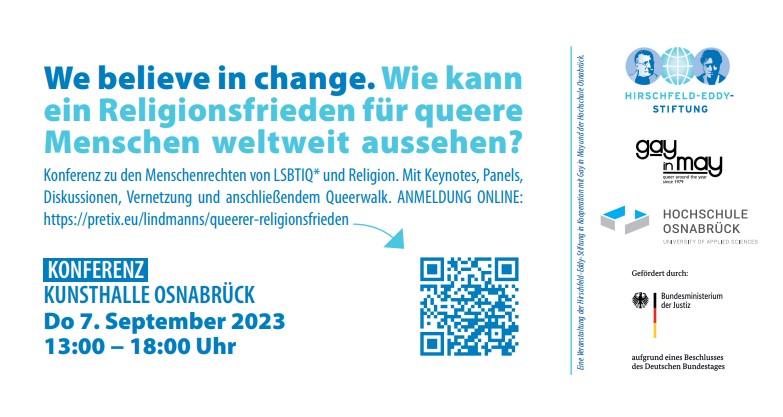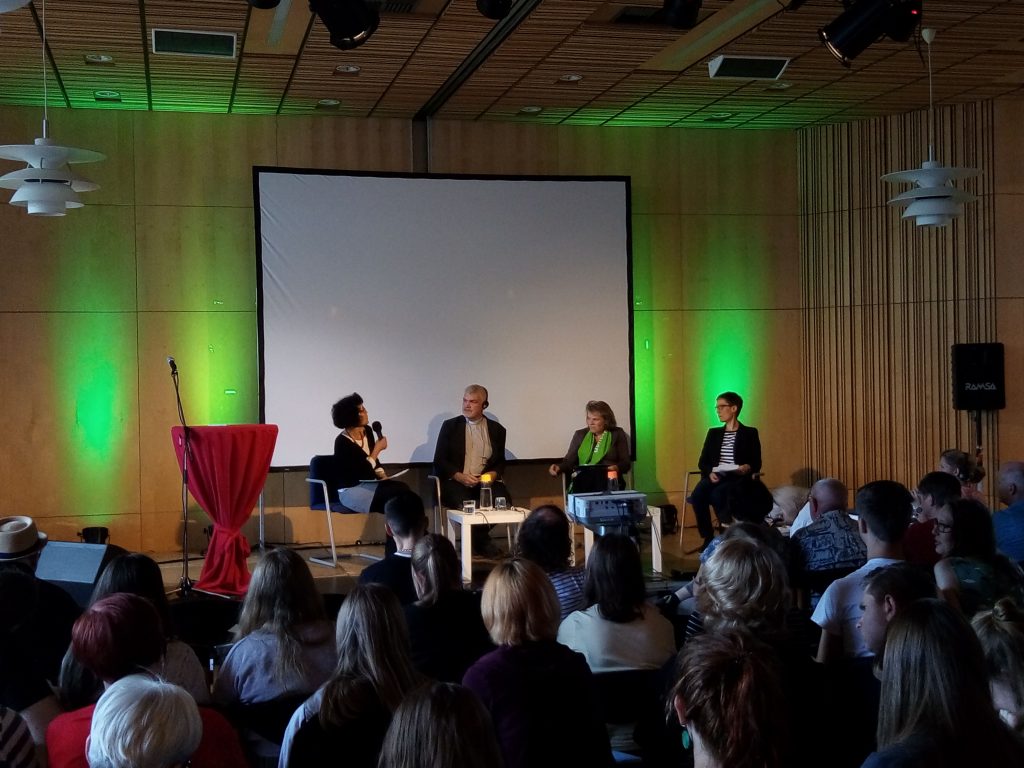In March 2023, a group of Ugandan parents of LGBTIQ+ children published an open letter to Uganda’s president, Yoweri Museveni, imploring him not to sign into law the Anti-Homosexuality Bill which had been tabled in the country’s parliament.
Schlagwort: Nigeria
A talk with Ugandan LBQ+ activists

The relationship between religion and sexuality has been complicated throughout history. To date, religion is the basis on which many African countries and those within their borders have an anti-sexuality stance. Sexuality, more so sex, is taboo, one that shouldn’t be discussed. This lack of information for individuals and communally as a society means there are many misconceptions fuelled by religious morality.
Deutsch
Conference report (deutsch)
Date: 7 September 2023
Duration: 1 – 6 pm, followed by a “queer walk”
Location: Kunsthalle Osnabrück, Hasemauer 1, 49074 Osnabrück
Conference languages: English and German with translations
Termin: 7. September 2023
Dauer: 13 – 18 Uhr, mit anschließendem Queerwalk
Ort: Kunsthalle Osnabrück, Hasemauer 1, 49074 Osnabrück
Konferenzsprachen: Englisch und Deutsch
Hintergrundbericht zur European Conference on African Studies 2023
Literaturliste: hier (PDF)
Religionsgemeinschaften beeinflussen Verhalten, Vorstellungen und Vorurteile, zudem üben sie gezielt Einfluss auf politische Machthaber aus. Die jüngsten Entwicklungen in Uganda im Kontext des neuen Anti-Homosexuellen-Gesetzes zeigen das beispielhaft. Geber von Entwicklungsgeldern an Kirchen wirken hier unheilvoll.
Cesnabmihilo Dorothy Nuhu-Aken’Ova (58) is a Nigerian linguist and feminist who began working for women’s, youth and LGBTI rights in her homeland in the mid-1990s. She is the executive director of the International Centre for Sexual Reproductive Rights (INCRESE), which she founded in 2000. Her motivation: “I do not like injustice, and I have zero tolerance for all violations of human rights!”
Opening statement by Sarah Kohrt, LGBTI Platform for Human Rights at the Hirschfeld-Eddy Foundation, at the 2019 Evangelischer Kirchentag (German Protestant Church Conference)
Deutsche Fassung hier
Thank you very much for the invitation to speak here, which I greatly appreciate. It is wonderful to see that the Kirchentag has had a Rainbow Center for many years now. That is an important step – just like events such as this one today.
My talk will consist of four theses. The first comes from a text written by Tim Kuschnerus, the managing director of the Protestant office of the Joint Conference Church and Development (GKKE), for the blog of the LSVD (Lesbian and Gay Federation in Germany): “The Christian churches are part of the problem. This realization can lead to only one conclusion in my opinion: churches, and by that I mean primarily their development organizations here in Germany, must work toward becoming part of the solution.”
Eingangsstatement von Sarah Kohrt, LGBTI-Plattform Menschenrechte der Hirschfeld-Eddy-Stiftung beim Evangelischen Kirchentag 2019
Article in English
 Vielen Dank für die Einladung, ich weiß sie sehr zu schätzen. Es ist ganz erfreulich, dass es seit vielen Jahren ein Regenbogenzentrum bei den Kirchentagen gibt. Das ist – genau wie solche Veranstaltungen wie heute – ein wichtiger Schritt.
Vielen Dank für die Einladung, ich weiß sie sehr zu schätzen. Es ist ganz erfreulich, dass es seit vielen Jahren ein Regenbogenzentrum bei den Kirchentagen gibt. Das ist – genau wie solche Veranstaltungen wie heute – ein wichtiger Schritt.
Mein Vortrag hat vier Thesen. Die erste stammt aus einem Text, den Tim Kuschnerus, Evangelischer Geschäftsführer der Gemeinsamen Konferenz Kirche und Entwicklung für den LSVD-bLOG geschrieben hat: „Die christlichen Kirchen sind Teil des Problems. Diese Erkenntnis kann aus meiner Sicht nur eine Konsequenz haben: Kirchen, und ich spreche hier vor allem für den Bereich der kirchlichen Entwicklungswerke in Deutschland, müssen dazu beitragen, dass sie Teil der Lösung werden.“
Das ist dann auch die erste These: Die Kirchen müssen Teil der Lösung werden, bislang sind sie Teil des Problems
Olumide Popoola and Elnathan John in Berlin
Olumide Popoola, a German-Nigerian author and performer, has just returned from a reading tour in Nigeria to present her new book When We Speak of Nothing.
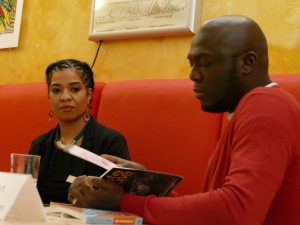 Popoola’s novel tells the story of Karl, a young black Londoner, who travels to Nigeria for the first time at the age of 18 to visit his father, whom he has never met, in Port Harcourt. Karl is a trans man whose passport still shows the sex he was assigned at birth. In Port Harcourt he gets a serious case of culture shock, remains much longer than planned, falls in love, and loses contact with his best friend Abu in London. It is a novel about friendship and what it means to grow up black in London today.
Popoola’s novel tells the story of Karl, a young black Londoner, who travels to Nigeria for the first time at the age of 18 to visit his father, whom he has never met, in Port Harcourt. Karl is a trans man whose passport still shows the sex he was assigned at birth. In Port Harcourt he gets a serious case of culture shock, remains much longer than planned, falls in love, and loses contact with his best friend Abu in London. It is a novel about friendship and what it means to grow up black in London today.
Olumide Popoola und Elnathan John in Berlin
Olumide Popoola, deutsch-nigerianische Autorin und Performerin ist gerade von einer Lesereise in Nigeria zurück, um ihr neues Buch vorzustellen: When we speak of Nothing.
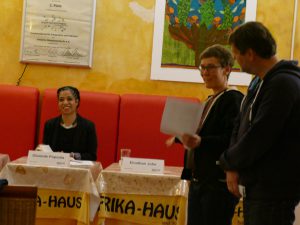 Popoolas Roman erzählt die Geschichte von Karl, einem jungen Schwarzen Londoner, der mit 18 zum ersten Mal in seinem Leben nach Nigeria fährt, um dort in Port Harcourt seinen Vater zu treffen, dem er noch nie begegnet ist. Karl ist ein Trans*mann, in dessen Pass noch sein Geburtsgeschlecht steht. In Port Harcourt erlebt er einen größeren Kulturschock, bleibt viel länger als geplant, verliebt sich und verliert den Kontakt zu seinem besten Freund Abu in London. Es ist ein Roman über Freundschaft und das Aufwachsen als Schwarzer im heutigen London.
Popoolas Roman erzählt die Geschichte von Karl, einem jungen Schwarzen Londoner, der mit 18 zum ersten Mal in seinem Leben nach Nigeria fährt, um dort in Port Harcourt seinen Vater zu treffen, dem er noch nie begegnet ist. Karl ist ein Trans*mann, in dessen Pass noch sein Geburtsgeschlecht steht. In Port Harcourt erlebt er einen größeren Kulturschock, bleibt viel länger als geplant, verliebt sich und verliert den Kontakt zu seinem besten Freund Abu in London. Es ist ein Roman über Freundschaft und das Aufwachsen als Schwarzer im heutigen London.

